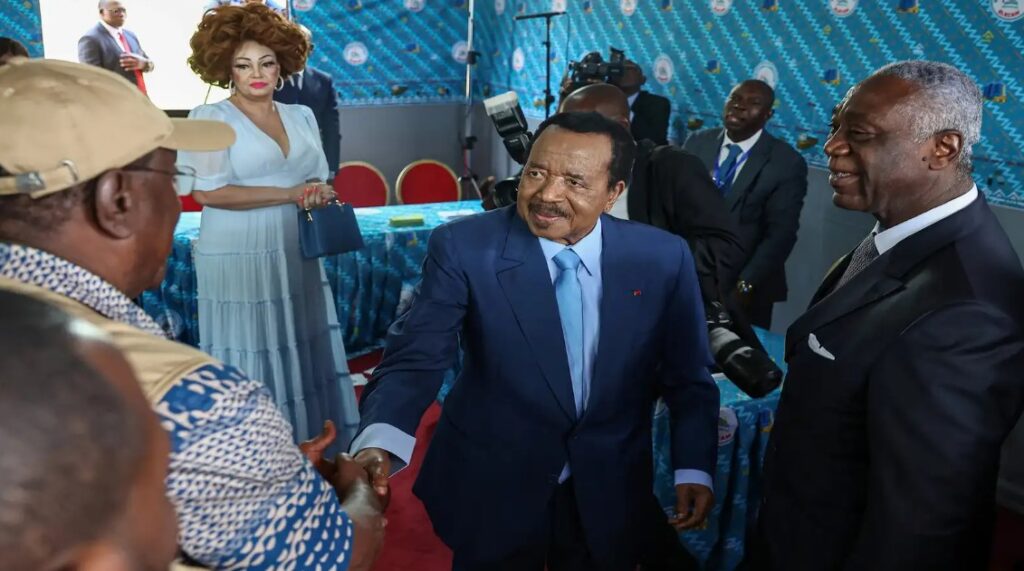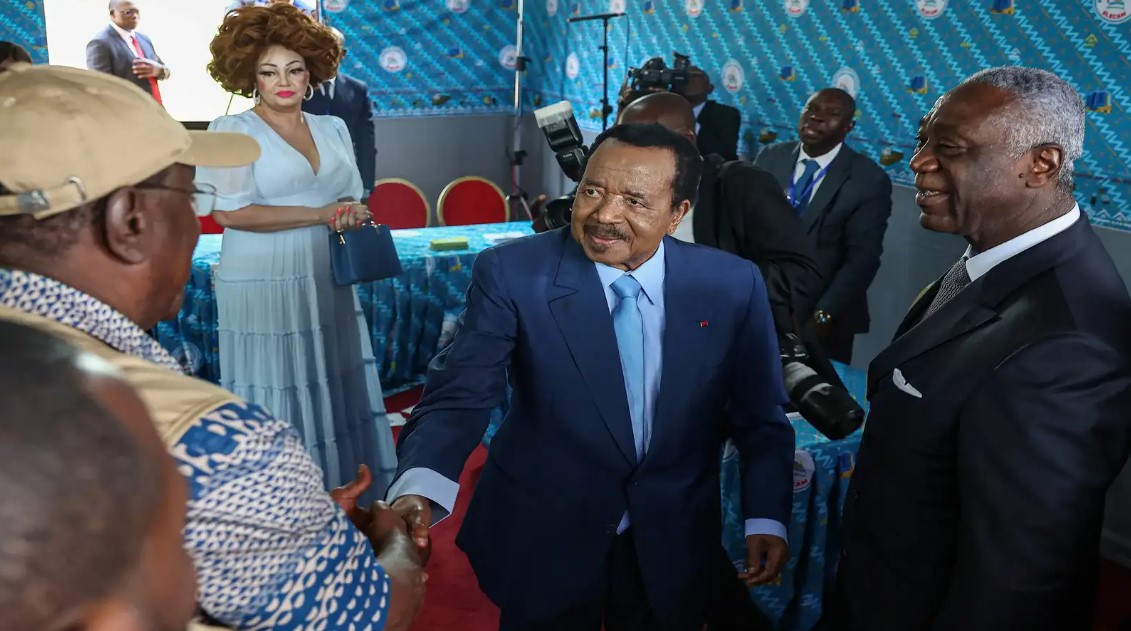In a historic yet controversial political development, Paul Biya, the 92-year-old president of Cameroon, has once again emerged victorious in the country’s presidential election, extending his already four decade rule. Official results released by the Constitutional Council on Monday declared Biya the winner, confirming his eighth consecutive term in office.
“Hereby proclaimed President-elect: the candidate Biya Paul,” announced Clement Atangana, President of the Constitutional Council, in a televised statement broadcast from Yaoundé. The declaration cements Biya’s position as the world’s oldest serving head of state and one of the longest-reigning leaders in modern political history.

A Leader Who Has Defined Cameroon’s Political Landscape
Paul Biya first assumed power in 1982, following the resignation of his predecessor, Ahmadou Ahidjo. Since then, he has presided over Cameroon through transition, turmoil, and transformation, maintaining a tight grip on the country’s political institutions and military apparatus.
In 2008, Biya orchestrated a constitutional amendment that removed presidential term limits, effectively allowing him to rule indefinitely. Since then, every election has reaffirmed his dominance, despite recurring allegations of vote manipulation, limited political freedom, and weak opposition structures.
Over the years, Biya’s administration has been marked by stability and continuity qualities that his supporters often cite as crucial in a region plagued by coups and insurgencies. However, critics argue that this stability has come at the expense of democratic progress, civil liberties, and generational political change.
The 2025 Election: A Familiar Outcome Amid Rising Challenges
This year’s election took place under heightened political tension. Biya’s main challenger, Issa Tchiroma Bakary, a former government spokesperson and employment minister in his late 70s, broke ranks with the ruling elite to lead a reform-driven opposition campaign.
Bakary’s candidacy drew large crowds, social media traction, and endorsements from a coalition of opposition parties and civic organizations. His message focused on youth empowerment, governance reform, and economic diversification resonated with urban voters and younger demographics frustrated by decades of the same leadership.
Despite this momentum, the final results showed Biya maintaining a commanding lead, underscoring the enduring influence of his Cameroon People’s Democratic Movement (CPDM), which has dominated national politics for decades. Opposition parties have voiced skepticism about the transparency of the vote count and called for electoral reforms to ensure fairness in future contests.
Governance, Longevity, and the Question of Succession
Now entering his 43rd year in power, President Biya’s continued rule raises pressing questions about succession planning and governance stability in Cameroon.
At 92, the president remains largely absent from public view, frequently conducting state affairs from the presidential palace or while abroad in Switzerland, where he reportedly spends considerable time.
This leadership style characterized by delegation to loyal ministers and centralized control has fostered a system in which the state’s stability is deeply tied to one individual. Analysts warn that this creates long-term risks for institutional continuity should a sudden leadership vacuum occur.
Despite his age, Biya has shown no indication of stepping down or naming a successor. His re-election could extend his tenure until he approaches 100 years old, further solidifying his place alongside figures such as Teodoro Obiang Nguema of Equatorial Guinea and the late Robert Mugabe of Zimbabwe in Africa’s long-serving leadership narrative.
Economic and Security Challenges Ahead
Cameroon’s political continuity stands in stark contrast to its deep-rooted socio-economic challenges.
The country faces rising youth unemployment, regional inequalities, and ongoing conflict in its Anglophone regions, where separatist groups continue to clash with government forces. The crisis has displaced hundreds of thousands and strained national unity.
Meanwhile, Cameroon’s northern border with Nigeria remains volatile due to Boko Haram insurgency activities, adding security pressure to a government already stretched thin.
Economic analysts note that while Cameroon has maintained steady growth in recent years, driven by agriculture, oil, and infrastructure, persistent corruption, weak governance, and limited private sector development continue to hinder progress.
International partners, including the African Union, European Union, and United Nations, have repeatedly urged the Biya administration to prioritize inclusive dialogue, decentralization, and reconciliation efforts to strengthen national cohesion.
A Legacy of Power and Controversy
Paul Biya’s leadership has spanned eight U.S. presidents, seven French presidents, and five British prime ministers, underscoring his remarkable political longevity.
Domestically, his rule is often viewed as a blend of authoritarian stability and cautious modernization. Under his tenure, Cameroon has seen advances in infrastructure and regional diplomacy but has also struggled with press freedom restrictions, human rights abuses, and a lack of institutional renewal.
To his supporters, Biya is a symbol of experience and endurance a steady hand guiding Cameroon through regional instability. To his critics, he represents a stagnant political system unwilling to embrace generational change or democratic accountability.
Global Reactions and Future Outlook
The announcement of Biya’s re-election has drawn mixed reactions globally.
Some African leaders have congratulated the veteran statesman, emphasizing his contributions to regional stability.
However, human rights organizations and democracy advocates have expressed concern over electoral transparency, opposition suppression, and the limited prospects for political transition.
Observers note that as the world’s oldest sitting president, Biya’s continued leadership symbolizes both Africa’s enduring struggles with entrenched political systems and the resilience of long-standing power structures.
The next few years will likely test Cameroon’s ability to balance continuity with the urgent need for political renewal, inclusive governance, and generational participation in leadership.
Conclusion
Paul Biya’s re-election at 92 marks a defining moment in Cameroon’s modern history one that underscores the complexities of leadership longevity in African politics.
As the world’s oldest head of state, Biya’s continued grip on power offers both stability and stagnation, reflecting the paradox of a nation anchored in experience yet yearning for change.
Whether his next term brings genuine reform or simply extends the status quo remains to be seen. But one thing is certain: Cameroon’s political identity will continue to be inseparable from the legacy of Paul Biya, a leader whose era has outlasted generations, governments, and global transformations.

